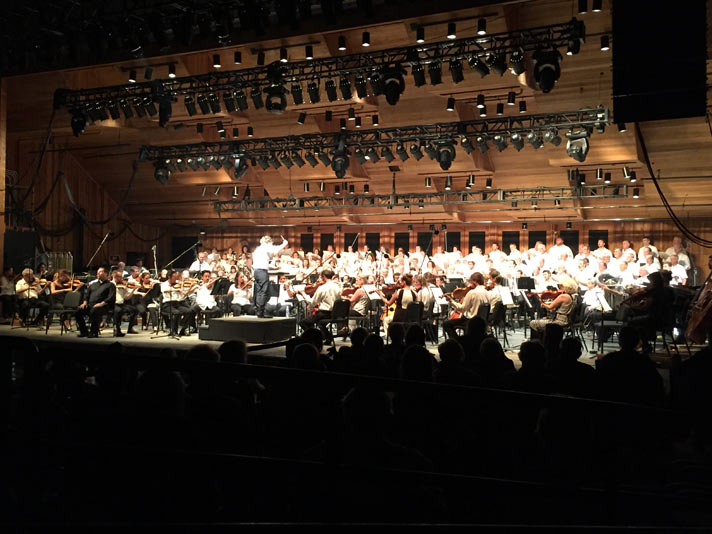Epic: – of unusually great size or extent; – spectacular; very impressive; awesome
The Britt Orchestra opened the 2015 Classical Season Friday evening, July 31, delivering a concert that was epic in all the senses of the word listed above: The performing ensemble on stage was the largest ever to perform at the Britt Pavilion and it not only included the largest group of orchestra musicians, but also over 140 singers from three combined choirs, AND three fine vocal soloists. The orchestra played pieces never before heard on the Britt Hill: Scriabin’s Poem of Ecstasy, which hadn’t been performed here before because it requires such a large orchestra, and Carl Orff’s Carmina Burana, which requires not only the large orchestra, but massive choral support as well. Also never before heard was the first piece that launched the new season with a bang, or more precisely, with a fanfare: Music Director Teddy Abrams’ own composition, Kentucky Royal Fanfare.
The result was a concert that was indeed spectacular, very impressive, and awesome. The feat was made even more so by the conditions which the performers needed to overcome in delivering their memorable epic performance of the concerts’ three pieces: 107 degree heat and forest fire-generated smoke as thick as pea soup. Despite the conditions, a packed crowd of classical music lovers filled the Britt seats and lawn and the show went on. The orchestra musicians had to have been roasting on the stage – open air and hence not really air-condition coolable. At one calm point, Maestro Teddy Abrams, who presided and directed the pieces with great energy, enthusiasm, and physicality, had to pick up his score and shake to drain the pool of sweat from it. The musicians similarly had to play in sauna-like conditions. But to their credit, the performers overcame all those obstacles and the concert performances were an unqualified triumph.
This is Maestro Abrams sophomore season as music director for the Britt Festivals Classical Season and he made it clear to everyone that he has taken full command of the orchestra, its programs, the music, and the quality of the product – all at the very best they have been in its 53 year history. So it was fitting that the season not only began with a fanfare, but that it was his original composition, Kentucky Royal Fanfare. Mr. Abrams composed the 5 minute piece for the occasion of Prince Charles’ March 2015 visit to Louisville, Kentucky, where Mr. Abrams is Music Director of the Louisville Orchestra during the regular concert season. Mr. Abrams has said “I wanted to create a piece that celebrated this [the Prince’s] spirit of caring for our earth and fellow man, and composing a work for the nobility and royalty in all of us seemed like the perfect present . . . .” The piece uses a complex rhythmic scheme which presents a challenge for the musicians, but with Mr. Abrams himself at the helm, the orchestra delivered an inspiring, uplifting, rousing performance of the piece that got the 2015 season off to a very auspicious start.
That was followed by a performance of Alexander Scriabin’s The Poem of Ecstasy (Le Poème de l’extase). Scriabin described the 20 minute piece as his “fourth symphony”, although it shuns the traditional symphonic division into four movements and is played as a single movement. Like Mr. Abrams Fanfare, Scriabin’s Poem employs an unusual rhythmic system and also employs a unique whole tone scale, with no leading tones, and thus, pages of music with little or no tonal resolution. Again a challenging piece for an orchestra to play. The work requires an unusually large orchestra. It is scored for 3 flutes, piccolo, 3 oboes, English horn, 3 clarinets, bass clarinet, 3 bassoons, contrabassoon, 8 horns, 5 trumpets, 3 trombones, tuba, timpani, bass drum, cymbals, triangle, small and large bells, tam-tam, celesta, organ (harmonium if the organ is not available), 2 harps and strings. Maestro Abrams assembled all the requisite instruments with their musicians, and delivered a performance that was a completely new experience for many of the audience (who had never been exposed to a live performance of Scriabin’s Poem before) and a very pleasant revelation. The performance was marked by a multitude of fine instrumental solos and contributions, including notable efforts by concertmaster-violinist Iggy Jang, clarinetist Andrea Levine, flautist Leslie Fagan, and contributions by several other members of the brass, woodwind and percussion sections. Again, Mr. Abrams succeeded in leading the orchestra to successfully meeting the challenges posed by the work, and delivered a memorable performance.
After an intermission, and opportunity to rehydrate and towel down, the orchestra again took the stage to deliver the highlight of the night: a performance of Carl Orff’s majestic Carmina Burana. They were joined on the stage, on long risers at the rear, by the combined singers of the Southern Oregon Repertory Singers and the Rogue Valley Chorale, with the eventual addition as the piece neared its climax, of the San Francisco Girls Chorus. As the piece unfolded, soloists Hugh Russell (Baritone), Javier Abreu (Tenor), and Celena Shaefer (Soprano) took places at the front of the stage as well. Carmina Burana is a 20th Century work, a scenic cantata composed by Orff in 1935 and 1936, based on 24 poems from the medieval 13th century collection (of the same name) of over 200 poems. Orff chose 24 of the poems, mostly in Latin, but also a bit of Middle High German and Old Provencal to use as the libretto for his masterpiece. “The selection covers a wide range of topics, as familiar in the 13th century as they are in the 21st century: the fickleness of fortune and wealth, the ephemeral nature of life, the joy of the return of Spring, and the pleasures and perils of drinking, gluttony, gambling and lust.” [Wikipedia, Carmina Burana (Orff), https://en.wikipedia.org/wiki/Carmina_Burana_%28Orff%29] Carmina Burana became the most popular piece of music composed in Germany at the time. “The popularity of the work continued to rise . . . . and by the 1960s Carmina Burana was well established as part of the international classic repertoire.” [Id.] Carmina Burana has been used in hundreds of films and television commercials and its opening movement, O Fortuna, has been embraced by popular culture and become one of the most familiar musical refrains in the world.
Carmina Burana is a truly grand piece of music, which everyone should experience a live performance of at least once in their lifetimes. The scope of it is, well, epic. The orchestral music is sublime, making good use of ALL sections, giving ALL at least one prominent highlight, employing the percussion section more and better than most composers. Top that with the awe-inspiring chorale singing, and then the remarkable solos, and it is an incomparable musical feast. I am really almost never at a loss for words, but I truly cannot find words to do justice to this piece and the extraordinary performance delivered at the Britt Pavilion on Opening Night of the 2015 Classical Season. So I offer you instead a one minute excerpt from the opening movement, O Fortuna:
The entire piece is over 60 minutes long, and THAT wasn’t even the highlight. As wonderful as that excerpt is, it can’t even come close to fully capturing just how good this performance was. The vocal solos were sung stunningly, and acted wonderfully to boot, including entertaining embodiments of drunkenness, etc. by Mr. Russell, very expressive gestures and expressions by Ms. Shafer, and a hilarious scamper away from the stage by Mr. Abreu. The interplay between the choirs and the orchestra, the choirs and the soloists, and the orchestra and the soloists was superb. This may well have been the top performance of ANY piece at ANY concert in the 53 year history of the Britt Festivals. Well done ALL, but especially Mr. Abrams, for conceiving it, bringing it together, pulling it off, and doing it all so successfully.
This was just the first of seven classical concerts for the 2015 season. The remaining six are equally as ambitious, promising, and potentially epic. Up next, the Second Night (Sat. Aug. 1) of the Classical Season offers an equally epic program: Samuel Adams’ Radial Play, John Adams’ Absolute Jest, and Igor Stravinsky’s incredible, history-making masterpiece, Rite of Spring. This is a world class orchestra, populated by top of the line musicians from notable orchestras around the U.S. and the world, in the hands of one of the most talented conductors/music directors on the classical scene today. If you are any kind of a fan of classical music, and within reasonable proximity of Jacksonville, Oregon, you are missing the experience of a lifetime if you don’t have tickets to one or more of these Britt Festivals 2015 Classical Season concerts. You can get them online at brittfest.org or by calling the box office at 541-773-6077 or 1-800-882-7488.

 Lee Greene was born & raised in a NJ family where the only religion worshipped was classical music, Leonard Bernstein was God, and the radio was constantly on and tuned to classical station WQXR (which is now always on in his Jacksonville home thanks to the miracle of the Internet). Growing up in the New York City metropolitan area and later while residing and practicing law in NYC, Lee attended oodles of Broadway and off-Broadway theater productions, as well as concerts and opera at Lincoln Center, Carnegie Hall and other NYC venues. Lee is now a retired attorney, runs a computer support business, and has served on the boards of Rogue Opera & Siskiyou Violins. Lee also writes Performing Arts reviews published on the website,
Lee Greene was born & raised in a NJ family where the only religion worshipped was classical music, Leonard Bernstein was God, and the radio was constantly on and tuned to classical station WQXR (which is now always on in his Jacksonville home thanks to the miracle of the Internet). Growing up in the New York City metropolitan area and later while residing and practicing law in NYC, Lee attended oodles of Broadway and off-Broadway theater productions, as well as concerts and opera at Lincoln Center, Carnegie Hall and other NYC venues. Lee is now a retired attorney, runs a computer support business, and has served on the boards of Rogue Opera & Siskiyou Violins. Lee also writes Performing Arts reviews published on the website,